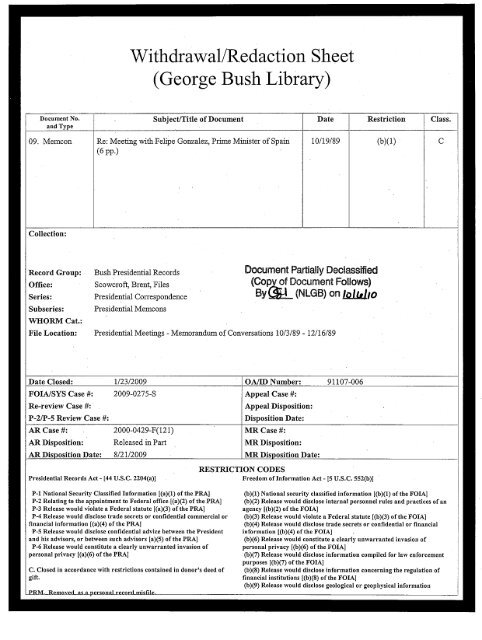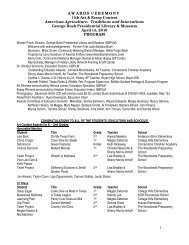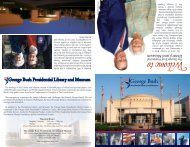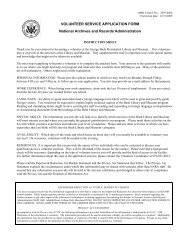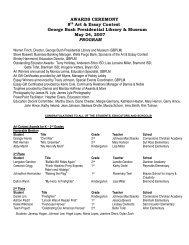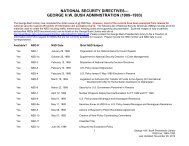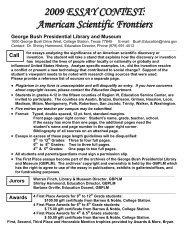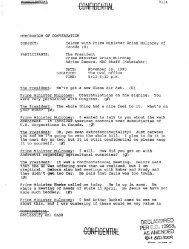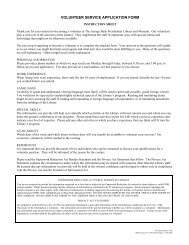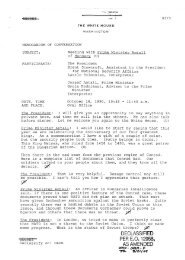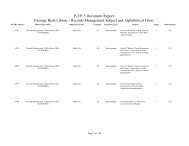Withdrawal/Redaction Sheet - George Bush Presidential Library and ...
Withdrawal/Redaction Sheet - George Bush Presidential Library and ...
Withdrawal/Redaction Sheet - George Bush Presidential Library and ...
You also want an ePaper? Increase the reach of your titles
YUMPU automatically turns print PDFs into web optimized ePapers that Google loves.
<strong>Withdrawal</strong>/<strong>Redaction</strong> <strong>Sheet</strong><br />
(<strong>George</strong> <strong>Bush</strong> <strong>Library</strong>)<br />
Document No. i<br />
I<br />
I <strong>and</strong> Type i<br />
Subject/Title of Document Date Restriction Class.<br />
09. Memcon Re: Meeting with Felipe Gonzalez, Prime Minister of Spain 10/19/89 (b)(1) C<br />
(6 pp.)<br />
Collection:<br />
Record Group:<br />
Office:<br />
<strong>Bush</strong> <strong>Presidential</strong> Records<br />
Scowcroft, Brent, Files<br />
Document Partially Declassified<br />
(Co~ Document Follows)<br />
By (NlGB) on l1iliLllo<br />
Series:<br />
<strong>Presidential</strong> Correspondence<br />
Subseries: <strong>Presidential</strong> Memcons<br />
WHORMCat.:<br />
File Location: <strong>Presidential</strong> Meetings - Memor<strong>and</strong>um of Conversations 10/3/89 - 12/16/89<br />
Date Closed:<br />
FOIAlSYS Case #:<br />
Re-review Case #: .<br />
P-2IP-5 Review Case #:<br />
AR Case #:<br />
AR Disposition:<br />
112312009<br />
2009-0275-S<br />
2000-0429-F(121)<br />
Released in Part<br />
AR Disposition Date: 8/2112009<br />
<strong>Presidential</strong> Records Act - [44 U.S.C. 2204(a))<br />
OAJID Number: 91107-006<br />
Appeal Case #:<br />
Appeal Disposition:<br />
Disposition Date:<br />
MRCase#:<br />
MR Disposition:<br />
MR Disposition Date:<br />
RESTRICTION CODES<br />
Freedom of Information Act - [5 U.S.C. 552(b))<br />
P-l National Security Classified Information [(a)(l) ofthe PRA)<br />
P-2 Relating to the appointment to Federal office.[(a)(2) of the PRA)<br />
P-3 Release would violate a Federal statute [(a)(3) ofthe PRA)<br />
P-4 Release would disclose trade secrets or confidential commercial or<br />
financial information [(a)(4) of the PRA)<br />
P-5 Release would disclose confidential advice between the President<br />
<strong>and</strong> his advisors, or between such advisors [a)(5) of the PRA)<br />
P-6 Release would constitute a clearly unwarranted invasion of<br />
personal privacy [(a)(6) of the PRA)<br />
C Closed in accordance with restrictions contained in donor's deed of<br />
gift.<br />
(b)(l) National security classified information [(b)(l) ofthe FOIA)<br />
(b )(2) Release would disclose internal personnel rules <strong>and</strong> practices of an<br />
agency [(b)(2) of the FOIA)<br />
(b)(3) Release would violate a Federal statute [(b)(3) ofthe FOIA)<br />
(b)(4) Release would disclose trade secrets or confidential or financial<br />
information [(b)(4) of the FOIA)<br />
(b)(6) Release would constitute a clearly unwarranted invasion of<br />
personal privacy [(b)(6) of the FOIA)<br />
(b)(7) Release would disclose information compiled for law enforcement<br />
purposes [(b)(7) of the FOIA)<br />
(b )(8) Release would disclose information concerning the regulation of<br />
financial institutions [(b)(8) of the FOIA)<br />
(b)(9) Release would disclose geological or geophysical information<br />
PR~. Rpmoved asap£nill~~rrlllmlwii·
CmJFIDfmTIl'zL 8443<br />
MEMORANDUM OF CONVERSATION<br />
SUBJECT:<br />
PARTICIPANTS:<br />
Meeting with Felipe Gonzalez, Prime Minister<br />
of Spain (U)<br />
The President<br />
The Vice President<br />
James A. Baker, Secretary of State<br />
Nicholas Brady, Secretary of the Treasury<br />
Richard Cheney, Secretary of Defense<br />
Brent Scowcroft, Assistant to the President<br />
for National Security Affairs '<br />
Robert M. Gates, Assistant to the President<br />
<strong>and</strong> Deputy for National Security Affairs<br />
Joseph Zappala, U.S. Ambassador to Spain<br />
Adrian Basora, Director for European Economic<br />
Affairs, NSC Staff (Notetaker)<br />
Felipe Gonzalez, Prime Minister<br />
Francisco Fern<strong>and</strong>ez Ordonez, Foreign Minister<br />
Carlos Solchaga, Finance Minister<br />
Rosa Conde, Minister/Government Spokesperson<br />
Julian Santamaria, Spanish Ambassador to U.S.<br />
Fern<strong>and</strong>o Gomez Aviles-Casco, Secretary<br />
General of Commerce<br />
Eudaldo Mirapeix, Foreign Ministry Director<br />
General for North America<br />
Juan Antonio Yanez, International Affairs<br />
Advisor to the Prime Minister (Notetaker)<br />
DATE, TIME<br />
AND PLACE<br />
October 19, 1989, 11:00 a.m.- 12:20 p.m.<br />
The Oval Office<br />
The President: First, I w~nt to wish you a very warm welcome to<br />
Washington. We have a wide range of issues to discuss. Let me<br />
suggest that you lead off with the issues that are on your mind.<br />
(U)<br />
Prime Minister Gonzalez: There have' been very positive changes<br />
in our bilateral relations. These have to do in part with<br />
Spain's own internal political <strong>and</strong> economic evolution as well as<br />
Spain's attempt to define its international role <strong>and</strong> move away<br />
from its previous isolationism. We are ratifying our membership<br />
in the WEU; we are fully involved in the construction of the<br />
European community, <strong>and</strong> we are participants in the<br />
Declassify 'on:<br />
OADR<br />
CONFIDENTIAl<br />
, DECLASSIFIED IN PART<br />
PER E.O. 12958, AS AMENDED<br />
~ 'bIZlicq<br />
g~-04c=t-F
£OHF IDK~lT 1 1 '1,<br />
CONFIDENTIAL<br />
nonproliferation treaty. Our policies are becoming more defined,<br />
more open to the rest of the world. Spain is becoming firmly<br />
identified as a European, Western nation. ()2')<br />
As to relations with the United States, we are looking for points<br />
of exp<strong>and</strong>ed cooperation. There had been difficulties in recent<br />
years, but now these have been overcome. We need to define<br />
Spain's relationship with the U.S. within the new East-West<br />
'context. We Western Europeans are focusing very heavily,<br />
sometimes obsessively, on the changes in Eastern Europe. At<br />
times we worry about them. The speed of change is almost<br />
dizzying. In Pol<strong>and</strong>, there is no alternative to the present<br />
government because it represents ~ alternative. The<br />
alternative is already in power <strong>and</strong> we cannot let it fail. (~)<br />
In Hungary, it is remarkable that the country has even changed<br />
its name as part of the reform process. In Pol<strong>and</strong>, remarkably,<br />
the Secretary General of the Communist Party told the King that<br />
the page in Pol<strong>and</strong> had been definitively turned on the Communist<br />
experience.<br />
(7)<br />
In this period of change <strong>and</strong> stability, it would be frivolous to<br />
say that NATO is no longer needed. "The Federal German Republic<br />
represents a special challenge that we ~ust deal with carefully.<br />
(/,)<br />
With regard to bilateral relations, we would like to build up our<br />
exchanges based on agreements in the cultural <strong>and</strong> scientific<br />
fields, as well as in areas such as taxation, which can help to<br />
encourage investment in both directions. It is a sign of the<br />
times that, over the past year~ Spanish investment in the U.S.<br />
actually exceeded U.S. investment in Spain -- although I am sure<br />
this trend will not continue. (~<br />
The President: As I assess our bilateral relations, I see them<br />
as very sound. The very fact that you are here in the midst of<br />
an election campaign says something about the relationship. I<br />
agree with you regarding the dynamics of change in Eastern<br />
Europe. We support that change, <strong>and</strong> Secretary Brady is working<br />
hard to help put together financing to assist in the economic<br />
reforms there. (~)<br />
When I was in Pol<strong>and</strong> last July, it was remarkable to see General<br />
Jaruzelski <strong>and</strong> Solidarity leaders all in the same room for lunch<br />
at our Ambassador's residence. Even though Jaruzelski had jailed<br />
these same leaders only a few years earlier, they were joking<br />
together. We have a great affection for Pol<strong>and</strong> here in the U.S.;<br />
in fact, it is said that there are more Poles, or Polish<br />
Americans, in Chicago than 'in Warsaw. (~)<br />
CQNFIDg~l"TI~l<br />
80NFIOENTIAl
CONFIDENTIAh<br />
EONFIOENTIAL<br />
Regarding NATO, Secretary General Woerner visited Washington<br />
recently <strong>and</strong> suggested that NATO play a larger role regarding the<br />
changes in Eastern Europe. I am not sure exactly what he had in<br />
mind. I would be interested in hearing your views. (~)<br />
Secretary Baker: The Prime Minister <strong>and</strong> I had an interesting<br />
talk last night about the Soviet Union. Regarding NATO, it will<br />
definitely have a continuing role, not a diminished role,<br />
certainly not in the near term. We will need NATO to help us<br />
manage the changes in Eastern Europe. We will need it to help us<br />
deal with the consequences of the demise of Communism, even if<br />
there is less of a military challenge facing the alliance.<br />
Woerner's idea is that NATO can help to formulate the Western<br />
response, thus building up the political aspects of the NATO<br />
m<strong>and</strong>ate. (f:.)<br />
The Vice President: Based on my travels to Latin America, I am<br />
very impressed by Prime Minister Gonzalez' st<strong>and</strong>ing with Latin<br />
American leaders. With his prestige, he can help solve the<br />
problems that we face in Nicaragua <strong>and</strong> Panama. (q)<br />
Secretary Brady: Spain has been very helpful in implementing the<br />
new debt strategy. We very much appreciate Spain's role. There<br />
are two ways of looking at the debt problem: one approach takes<br />
account of the problems of our own banking system; the other<br />
looks at the debt problems of the countries themselves. On the<br />
latter score, I am frequently asked if Spain will provide new<br />
money to help alleviate the problem. (~<br />
I would also like to mention our goal of assuring full financing<br />
of the $1 billion structural adjustment fund to support economic<br />
reform in Pol<strong>and</strong>. The U.S. has offered to put up $200 million.<br />
We need to find the other $800 million, <strong>and</strong> I hope that Spain<br />
will contribute. ((t)<br />
The President: I had a group of bankers over the White House for<br />
drinks recently <strong>and</strong> I am now very sympathetic to Nick Brady's<br />
problem in getting the bankers to put up new money. I had<br />
thought that bringing.~hem to the White House would help soften<br />
them up, but then I overhead them talking among themselves off in<br />
a corner. They were complaining about the difficult sacrifices<br />
we were asking them to make. (~)<br />
I am very impressed with Mexican Pr~sident Salinas, both with the<br />
debt restructuring agreement he has signed on to, <strong>and</strong> with the<br />
steps he has taken since then to implement this agreement. ($2')<br />
Secretary Cheney: I had the honor to host a visit from Defense<br />
Minister Serra just recently. We had excellent discussions,<br />
which made it clear that our relationship has progressed beyond<br />
-eOHPIDEH'fIAL<br />
CONFIDENTIAL
the base negotiations to a stage of normal relations within the<br />
alliance. We talked about setting up a bilateral consultative<br />
group involving our two ministries of defense, which is something<br />
I would like to do. I very much agree that NATO's role will .be<br />
important in providing continuity <strong>and</strong>.stability in Europe over<br />
the coming years. (~<br />
Prime Minister Gonzalez: Turning back to Eastern Europe, I think<br />
it is important to be aware of the limits <strong>and</strong> difficulties of the<br />
reform process in both the political <strong>and</strong> economic spheres. When<br />
our bankers say they don't want to invest in Pol<strong>and</strong>, it is<br />
because Pol<strong>and</strong> does not yet have its new economic system in<br />
place. In the Soviet Union, Gorbachev does not know how to set<br />
up a market-based pricing system. Eastern Europe needs time to<br />
make the necessary adjustments -- <strong>and</strong> yet once the windows are<br />
open, one can no longer control the speed at which the winds of<br />
freedom blow in.(¢)<br />
On the Soviet Union, it is not ethnic problems but rather the<br />
explosion of nationalisms that represents the gravest danger,<br />
for example, in the Baltic republics. This represents one of the<br />
limits of perestroika. Orie of the very important questions we<br />
must face is whether the West is prepared to accept this limit.<br />
In my view, we cannot attempt to break up the Warsaw Pact.<br />
Gorbachev needs to have the military blocs continue in existence.<br />
Rationality <strong>and</strong> tranquility is needed on both sides. (~)<br />
Regarding Latin America, it is important not to focus solely on<br />
Central America, which we tend to do too much. The problems of<br />
democracy throughout the region are important <strong>and</strong> countries such<br />
as Argentina <strong>and</strong> Chile have more magnitude <strong>and</strong> impact than those<br />
in Central America. In Nicaragua, I think we are seeing an<br />
opportunity for democracy to be won irreversibly. L see this as<br />
the outcome, whoever wins the elections, as long as they are<br />
clean. I say this despite the suspicions that one may have about<br />
the S<strong>and</strong>inistas. I share these suspicions, in that the<br />
S<strong>and</strong>inistas do not have a democratic vocation, but I feel that<br />
they believe that they cannot avoid democratic elections. The<br />
opposition can win in February, or it can win four years later.<br />
The important thing i~· that the electoral process be a clean one.<br />
(9')<br />
On Panama, I have some ide.as that we might want to discuss, but<br />
not a plan. Perhaps we could talk about this tonight. (~)<br />
Finance Minister Solchaga: On the debt issues, Spanish policy<br />
has been very positive <strong>and</strong> we have pushed for a common EC<br />
position. We are concerned about the difficulty of finding new<br />
funds. It is important to take a variety of approaches to<br />
restructuring. We believe that in view of the international debt<br />
situation, the U.S. should agree to the proposed quota increase<br />
for the IMF. c.e:)<br />
COHFIDEHTIAL<br />
EONFIDENTIAl
tUNt-IUtN Iitlit<br />
2<br />
Foreign Minister Ordonez: In El Salvador, we are trying to<br />
provide strong support to President Cristiani. As to the<br />
U.S.-Spanish bilateral relationship, we now have a new framework.<br />
The new juridical framework should be-implemented, for example,<br />
the new cultural agreement. I hope we can move quickly to have a<br />
new science <strong>and</strong> technology agreement by Qvercoming the problems<br />
posed in the light of the U.S. Omnibus Trade Act. Fin Min<br />
SOlchaga tells me that with regard to the proposed tax treaty, we<br />
can finish off our negotiations within five days. On defense<br />
industrial cooperation, we would like to see a memor<strong>and</strong>um of<br />
underst<strong>and</strong>ing between the Defense department <strong>and</strong> our defense<br />
ministry which would provide for a better trade balance <strong>and</strong><br />
defense products. On the commercial side, we hope for increased<br />
exchanges. The Spanish bid for the Boston-Ne~ York train is an<br />
example of such a project on which we would appreciate your help.<br />
We should also be able to reach nuclear agreements based on the<br />
fact that Spain has signed the MPF treaty. And, of course, our<br />
Expo '92 in Seville will be a major event in which we look<br />
forward to U. S. participation. 'f)<br />
Secretary Baker: We have asked democratic political parties in<br />
Europe to support Mrs. Chamorro in her campaign in Nicaragua.<br />
This is permitted by Nicaraguan law. We would like to ask that<br />
you consider having Spain doing something in this regard. Also,<br />
in view of Spain's prestige in the region it would be very<br />
valuable to have Spanish observers in the Nicaraguan elections in<br />
addition to the EC observers already planned. ~)<br />
Prime Minister Gonzalez:<br />
I<br />
We, too,<br />
Spain is<br />
(b) (1)<br />
want to guarantee that this will be a clean election <strong>and</strong><br />
already present in Nicaragua towards this end. Vl)<br />
The President: Turning back to NATO, we want to push forward on<br />
the CFE negotiations. We think your concerns have been met on<br />
the paramilitary issue. I have been pleased with the Soviet<br />
reaction so far <strong>and</strong> expect that they will not ~ngage in foot<br />
dragging. But it is important that we not have a fractured NATO<br />
position. (~ .<br />
Prime Minister Gonzalez: I agree with you although perhaps the<br />
time frame you have set for the CFE negotiations is too short.<br />
Although we should try to meet the schedule,. there are some real<br />
technical problems that need to be sorted out carefully. I agree<br />
that alliance cohesion is important. If we can get the Soviets·<br />
to cut their military spending by as much as 3 or 4 percentage<br />
points of GNP, this would be of more assistance to the economy<br />
that all of the aid that the NATO allies <strong>and</strong> Japan could possibly<br />
provide. (%)<br />
(b)(1)
- ,-. ',';"-'..-:'<br />
€QNTIDE"NTIl'.L<br />
The President: We don't want the goal of completing the CFE<br />
negotiations promptly to slip if it can be avoided, so we should<br />
try to meet the goal. (fl)<br />
Prime Minister Gonzales: I agree with you completely. I will<br />
certainly not say anything in public implying that we should<br />
prolong the negotiations. (j!:.)<br />
secretary Baker: NATO has now gained the initiative in these<br />
negotiations <strong>and</strong> we should be sure to keep it. (fl)<br />
Secretary Cheney: I should mention the visit of Soviet Defense<br />
Minister Yazov which was an historic first. Our discussions were<br />
very interesting indeed. He talked about restructuring in every<br />
area except the strategic rocket forces. I asked him a direct<br />
question on this, but Yazov ducked it. He is clearly having a<br />
difficult time with the transition which is being required of the<br />
Soviet military. . (jl)<br />
Prime Minister Gonzalez:<br />
agreements. (9)<br />
The Soviets ~ to get arms control<br />
On the Middle East,despite the great difficulties, we need to<br />
get a dialogue started. The role of the u.S. is critical. I<br />
noticed that Secretary Baker was very skeptical yesterday, but<br />
even if the situation is difficult we should use whatever<br />
opportunities exist. ~)<br />
The President: If Secretary Baker was "grumpy" yesterday, it was<br />
because Prime Minister Shamir had put the wrong spin on what<br />
Secretary Baker was trying to do. First Shamir made a public<br />
statement misrepresenting the U.S. position, <strong>and</strong> then he called<br />
me one half hour later to talk about it. What we need to do is<br />
to get Shamir to implement his own plan. Instead, he is accusing<br />
us of pushing for a "Palestinian state," which is false. I agree<br />
that we should continue our engagement as long as there is still<br />
some chance. The fact that both the Government of Israel <strong>and</strong> the<br />
PLO are critical of the plan may mean that it is a good plan.<br />
(}i)<br />
Prime Minister Gonzalez: It may be that Shamir feels that he<br />
needs to say no to his own plan for domestic political reasons,<br />
but that at the same time he wants to be pushed to move ahead on<br />
the project so that he can say that he had no choice. (~<br />
Secretary Baker: The PLO is also very negative. ~<br />
The President: Let's go out now <strong>and</strong> make our statements to the<br />
press. We'll have more time to talk this evening. ~)<br />
€QHFIDEH'f'IA1


